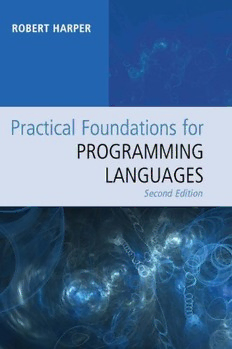
Practical Foundations For Programming Languages PDF
Preview Practical Foundations For Programming Languages
Practical Foundations for Programming Languages Thistextdevelopsacomprehensivetheoryofprogramminglanguagesbasedontypesys- temsandstructuraloperationalsemantics.Languageconceptsarepreciselydefinedbytheir staticanddynamicsemantics,presentingtheessentialtoolsbothintuitivelyandrigorously whilerelyingononlyelementarymathematics.Thesetoolsareusedtoanalyzeandprove propertiesoflanguagesandprovidetheframeworkforcombiningandcomparinglanguage features. The broad range of concepts includes fundamental data types such as sums and products, polymorphic and abstract types, dynamic typing, dynamic dispatch, subtyping andrefinementtypes,symbolsanddynamicclassification,parallelismandcostsemantics, andconcurrencyanddistribution.Themethodsaredirectlyapplicabletolanguageimple- mentation, to the development of logics for reasoning about programs, and to the formal verificationlanguagepropertiessuchastypesafety. This thoroughly revised second edition includes exercises at the end of nearly every chapterandanewchapterontyperefinements. Robert Harper is a professor in the Computer Science Department at Carnegie Mellon University. His main research interest is in the application of type theory to the design and implementation of programming languages and to the mechanization of their meta- theory. Harper is a recipient of the Allen Newell Medal for Research Excellence and the Herbert A. Simon Award for Teaching Excellence, and is an Association for Computing MachineryFellow. Practical Foundations for Programming Languages Second Edition Robert Harper CarnegieMellonUniversity 32AvenueoftheAmericas,NewYork,NY10013 CambridgeUniversityPressispartoftheUniversityofCambridge. ItfurtherstheUniversity’smissionbydisseminatingknowledgeinthepursuitof education,learning,andresearchatthehighestinternationallevelsofexcellence. www.cambridge.org Informationonthistitle:www.cambridge.org/9781107150300 ©RobertHarper2016 Thispublicationisincopyright.Subjecttostatutoryexception andtotheprovisionsofrelevantcollectivelicensingagreements, noreproductionofanypartmaytakeplacewithoutthewritten permissionofCambridgeUniversityPress. Firstpublished2016 PrintedintheUnitedStatesofAmerica AcatalogrecordforthispublicationisavailablefromtheBritishLibrary. LibraryofCongressCataloginginPublicationData Names:Harper,Robert,1957– Title:Practicalfoundationsforprogramminglanguages/RobertHarper, CarnegieMellonUniversity. Description:Secondedition.|NewYorkNY:CambridgeUniversityPress, 2016.|Includesbibliographicalreferencesandindex. Identifiers:LCCN2015045380|ISBN9781107150300(alk.paper) Subjects:LCSH:Programminglanguages(Electroniccomputers) Classification:LCCQA76.7.H3772016|DDC005.13–dc23 LCrecordavailableathttp://lccn.loc.gov/2015045380 ISBN978-1-107-15030-0Hardback CambridgeUniversityPresshasnoresponsibilityforthepersistenceoraccuracyof URLsforexternalorthird-partyInternetWebsitesreferredtointhispublication anddoesnotguaranteethatanycontentonsuchWebsitesis,orwillremain, accurateorappropriate. Contents PrefacetotheSecondEdition pagexv PrefacetotheFirstEdition xvii Part I Judgments and Rules 1 Abstract Syntax 3 1.1 AbstractSyntaxTrees 3 1.2 AbstractBindingTrees 6 1.3 Notes 10 2 Inductive Definitions 12 2.1 Judgments 12 2.2 InferenceRules 12 2.3 Derivations 14 2.4 RuleInduction 15 2.5 IteratedandSimultaneousInductiveDefinitions 17 2.6 DefiningFunctionsbyRules 18 2.7 Notes 19 3 Hypothetical and General Judgments 21 3.1 HypotheticalJudgments 21 3.2 HypotheticalInductiveDefinitions 24 3.3 GeneralJudgments 26 3.4 GenericInductiveDefinitions 27 3.5 Notes 28 Part II Statics and Dynamics 4 Statics 33 4.1 Syntax 33 4.2 TypeSystem 34 4.3 StructuralProperties 35 4.4 Notes 37 vi Contents 5 Dynamics 39 5.1 TransitionSystems 39 5.2 StructuralDynamics 40 5.3 ContextualDynamics 42 5.4 EquationalDynamics 44 5.5 Notes 46 6 Type Safety 48 6.1 Preservation 48 6.2 Progress 49 6.3 Run-TimeErrors 50 6.4 Notes 52 7 Evaluation Dynamics 53 7.1 EvaluationDynamics 53 7.2 RelatingStructuralandEvaluationDynamics 54 7.3 TypeSafety,Revisited 55 7.4 CostDynamics 56 7.5 Notes 57 Part III Total Functions 8 Function Definitions and Values 61 8.1 First-OrderFunctions 61 8.2 Higher-OrderFunctions 62 8.3 EvaluationDynamicsandDefinitionalEquality 65 8.4 DynamicScope 66 8.5 Notes 67 9 System T of Higher-Order Recursion 69 9.1 Statics 69 9.2 Dynamics 70 9.3 Definability 71 9.4 Undefinability 73 9.5 Notes 75 Part IV Finite Data Types 10 Product Types 79 10.1 NullaryandBinaryProducts 79 10.2 FiniteProducts 81 10.3 PrimitiveMutualRecursion 82 10.4 Notes 83 vii Contents 11 Sum Types 85 11.1 NullaryandBinarySums 85 11.2 FiniteSums 86 11.3 ApplicationsofSumTypes 88 11.4 Notes 91 Part V Types and Propositions 12 Constructive Logic 95 12.1 ConstructiveSemantics 95 12.2 ConstructiveLogic 96 12.3 ProofDynamics 100 12.4 PropositionsasTypes 101 12.5 Notes 101 13 Classical Logic 104 13.1 ClassicalLogic 105 13.2 DerivingEliminationForms 109 13.3 ProofDynamics 110 13.4 LawoftheExcludedMiddle 111 13.5 TheDouble-NegationTranslation 113 13.6 Notes 114 Part VI Infinite Data Types 14 Generic Programming 119 14.1 Introduction 119 14.2 PolynomialTypeOperators 119 14.3 PositiveTypeOperators 122 14.4 Notes 123 15 Inductive and Coinductive Types 125 15.1 MotivatingExamples 125 15.2 Statics 128 15.3 Dynamics 130 15.4 SolvingTypeEquations 131 15.5 Notes 132 Part VII Variable Types 16 System Fof Polymorphic Types 137 16.1 PolymorphicAbstraction 137 16.2 PolymorphicDefinability 140 16.3 ParametricityOverview 142 16.4 Notes 144 viii Contents 17 Abstract Types 146 17.1 ExistentialTypes 146 17.2 DataAbstraction 149 17.3 DefinabilityofExistentialTypes 150 17.4 RepresentationIndependence 151 17.5 Notes 153 18 Higher Kinds 154 18.1 ConstructorsandKinds 155 18.2 ConstructorEquality 156 18.3 ExpressionsandTypes 157 18.4 Notes 158 Part VIII Partiality and Recursive Types 19 System PCF of Recursive Functions 161 19.1 Statics 162 19.2 Dynamics 163 19.3 Definability 165 19.4 FiniteandInfiniteDataStructures 167 19.5 TotalityandPartiality 167 19.6 Notes 169 20 System FPC of Recursive Types 171 20.1 SolvingTypeEquations 171 20.2 InductiveandCoinductiveTypes 172 20.3 Self-Reference 174 20.4 TheOriginofState 176 20.5 Notes 177 Part IX Dynamic Types 21 The Untyped λ-Calculus 181 21.1 Theλ-Calculus 181 21.2 Definability 182 21.3 Scott’sTheorem 184 21.4 UntypedMeansUni-Typed 186 21.5 Notes 187 22 Dynamic Typing 189 22.1 DynamicallyTypedPCF 189 22.2 VariationsandExtensions 192 22.3 CritiqueofDynamicTyping 194 22.4 Notes 195
